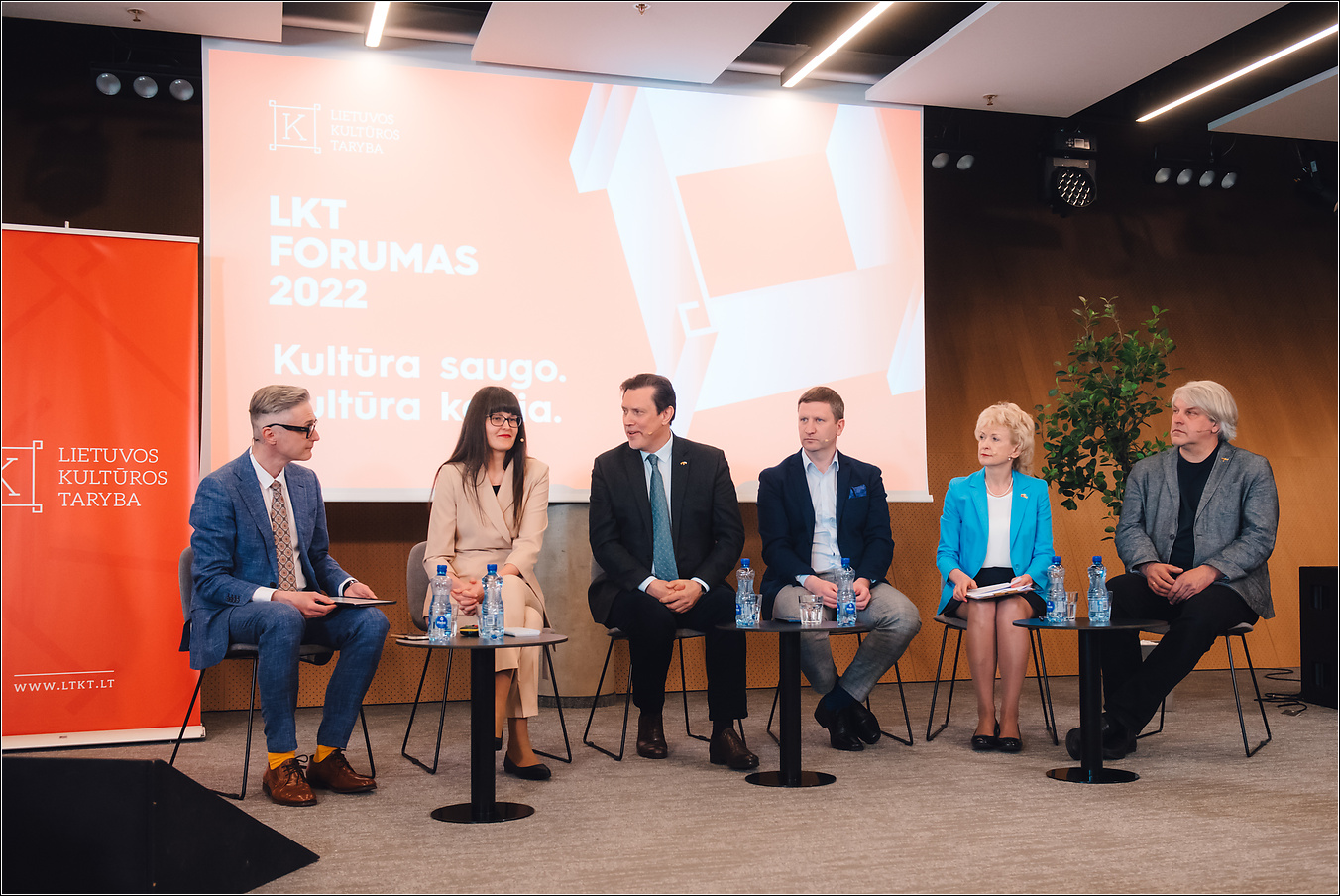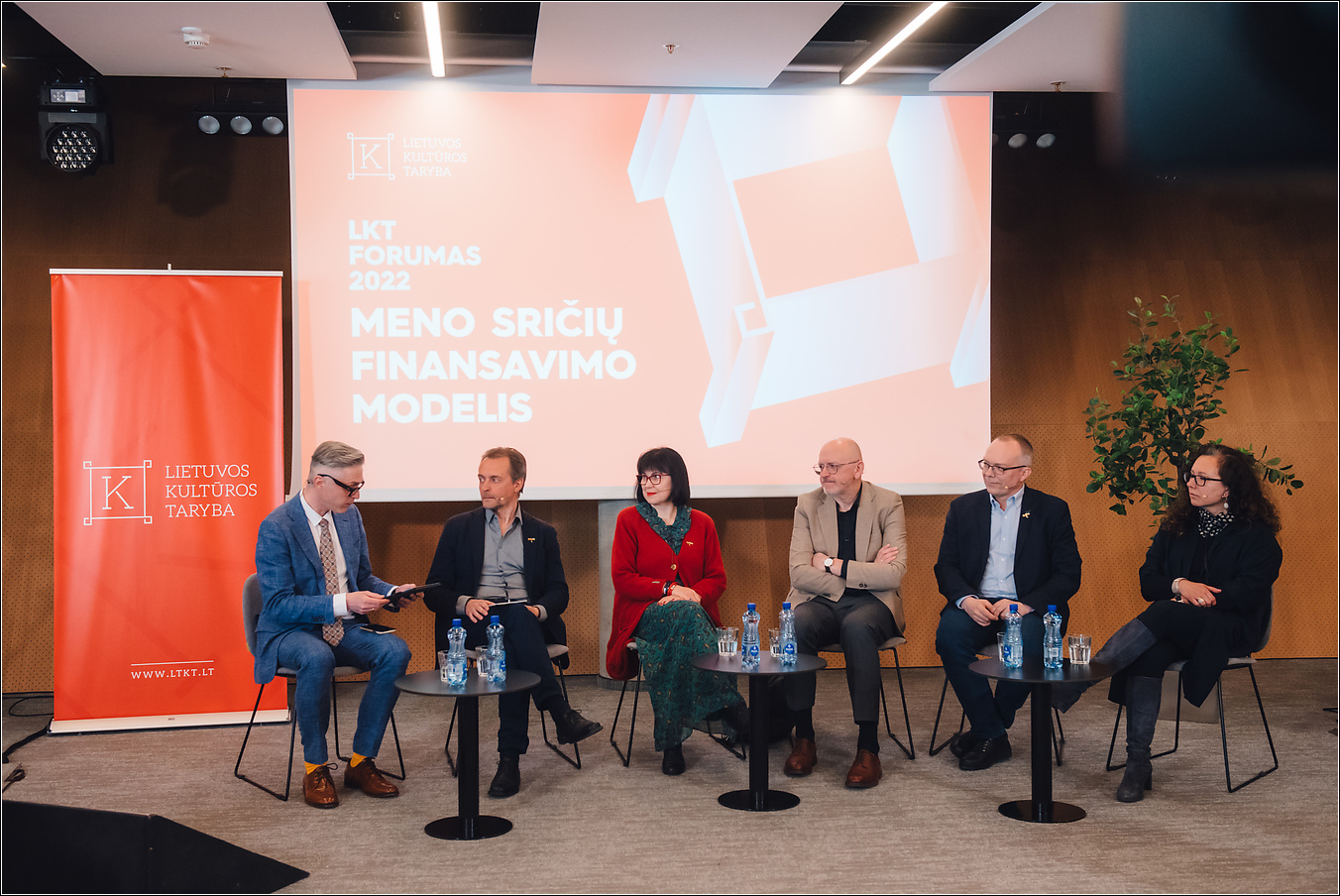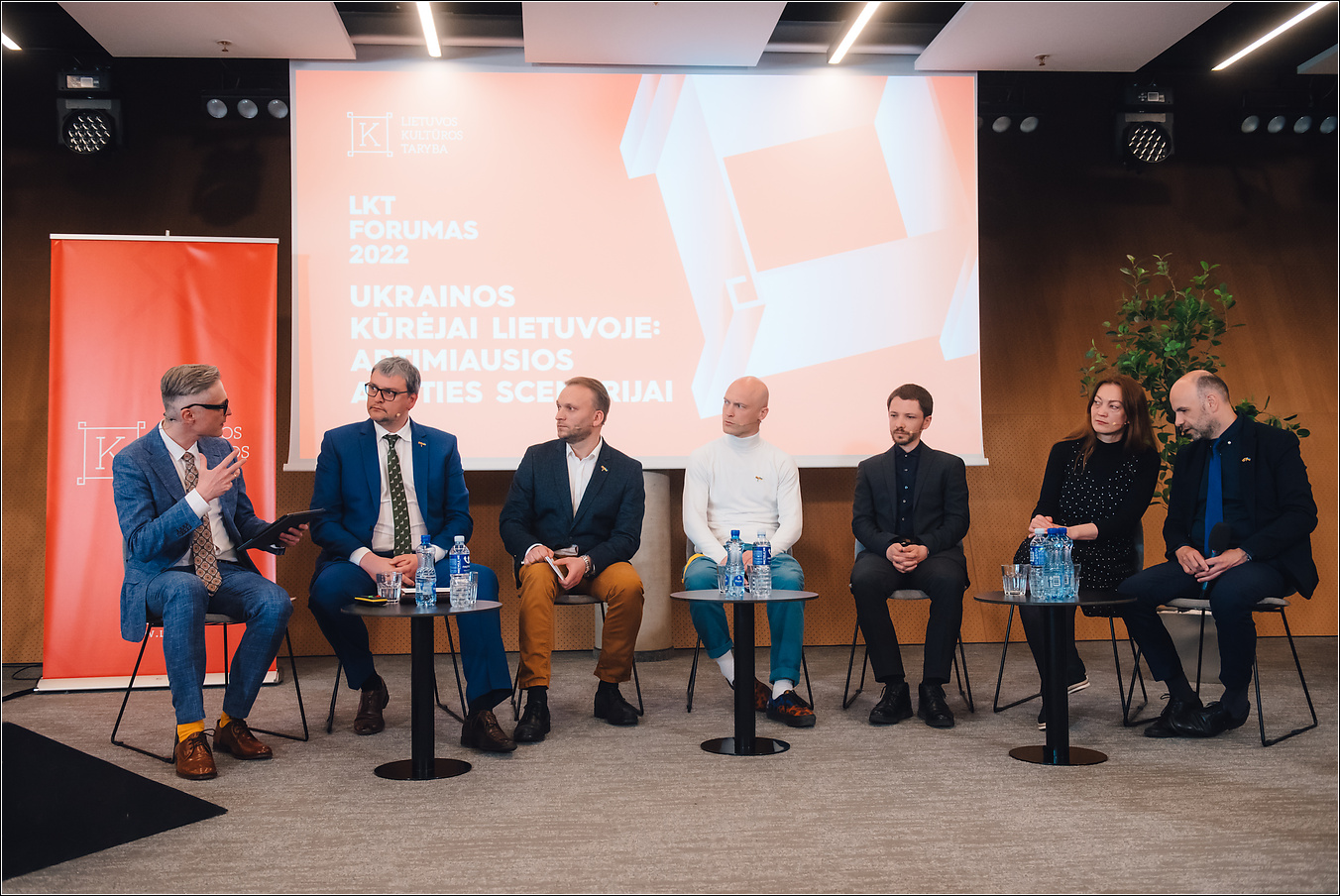 Photos by Vytenis Budrys.
Photos by Vytenis Budrys.This year, for the first time after a pandemic break, the Lithuanian Council for Culture (LCC) invited to a live LCC Forum. The theme of the traditional annual event, this time held at the Vilnius Airport Conference Centre on 11 May, is “Culture Protects. Culture Changes”. This slogan not only connects the themes discussed at the LCC Forum, but also becomes the principal point of reference for the activities of the Lithuanian Council for Culture for the next three years and reflects the vision of the new term of office of Council members, which started last year. The event was moderated by cultural historian Aurimas Švedas who posed questions to cultural politicians, members of the Lithuanian Council for Culture, as well as culture and art creators.
The discussion on the everyday reality and the prospects for the implementation and financing of Lithuanian cultural policy, which was also called “Culture Protects. Culture Changes”, was attended by Vytautas Juozapaitis, the Chairman of the Seimas Committee on Culture, Simonas Kairys, the Minister of Culture, Jolanta Karpavičienė, the Senior Adviser to the President, Asta Pakarklytė, the Chairperson of the Lithuanian Council for Culture, and Rimvydas Laužikas, a member of the Lithuanian Council for Culture, who all had an opportunity to speak.

Mr Juozapaitis, the Chairman of the Seimas Committee on Culture, welcomed the commitment of the Lithuanian Council for Culture to make public, from 2022, the personal composition of the working groups of culture and art experts who evaluate projects and grant applications, and also welcomed the establishment and activities of the regional councils for culture.
Minister of Culture Mr Kairys spoke about the changes and challenges posed by the constant renewal of the Lithuanian Council for Culture and the importance of cooperation between the Ministry of Culture and the Lithuanian Council for Culture. “There is no such mechanism in any other sector of public policy. Self-regulation and the principle of respectful distance – they simply do not exist anywhere else. I have worked actively in local government, I have seen how projects are selected and funded, so believe me, the Lithuanian Council for Culture, with all its pros and cons, is a very wonderful thing that needs to be preserved, valued and purified as much as possible”, Mr Kairys said.
Ms Karpavičienė, the Senior Adviser to the President, spoke about the mission of culture, about culture as a guarantor of distinctiveness, dignity, self-esteem, progress, and social welfare of the state and society. Therefore, according to Ms Karpavičienė, “it is important to identify culture as a power and to ensure the possibilities of its horizontal effect in various spheres of the life of the state and society”. Speaking about the Lithuanian Council for Culture and the retrospective of its activities, the Adviser to the President emphasised that the ambition set ten years ago to reform and democratise cultural governance, to expand self-regulation of culture has been realised and much has been done in this direction.
Asta Pakarklytė, the Chairperson of the Lithuanian Council for Culture, presented the statistics of the activities and scope of operation of the Lithuanian Council for Culture over the last 9 years, and discussed the vision and the outlook of the new term of the members together with Council member Mr Laužikas. “Since the establishment of the Lithuanian Council for Culture, a total of 63 000 applications have been received, almost 24 000 creative ideas have been funded, with allocations totalling EUR 173 million. More than 500 cultural professionals have contributed to the evaluation of these flows. The intensity and density is incredible, especially considering that these flows have been managed by not more than 30 Council staff members,” said Ms Pakarklytė.
In the second part of this year’s LCC Forum, members of the Lithuanian Council for Culture Vaidas Jauniškis, Jūratė Katinaitė, Deimantas Narkevičius and Dainius Vaitiekūnas presented the changes in the funding model for the fields of art, the motives for and the basis of these changes. Daina Urbanavičienė, the Vice-Minister of Culture, also participated in the discussion and supported the proposed changes.

From 2023 onwards, applicants will see a shorter list of types of art in the structure of the fields of art, as some of them will be consolidated into larger, cross-cutting groups. Fine art, photography and interdisciplinary art will be consolidated into visual arts from next year, architecture and design will be grouped under applied arts, and theatre, dance and circus will become performing arts. The funded fields of literature and music will remain unchanged, yet changes are foreseen in the programmes related to these fields.
When presenting the changes in the funding structure, Mr Jauniškis, a member of the Lithuanian Council for Culture, a theatre critic and a culture reviewer, talked about the merging of not only genres, but also the fields of art, which has been increasingly observed in the applications submitted to the funding calls. “Sometimes applicants don’t even know which field would be the most ideal match: whether it’s the one that is 50 per cent in the event, or the one that is 40 per cent, or whether they should choose something else. This creates problems when choosing the fields. We also see experts migrating from one field to another, because the professionals we invite are not experts in one field, but experts in several related fields,” said Mr Jauniškis. He highlighted increased competition for quality as a key aspect of the change in the funding structure of the fields.
The member of the Lithuanian Council for Culture also presented the practices of foreign countries, mentioning the example of Canada with its Council for the Arts abandoning sectoral funding altogether. It was pointed out that the Lithuanian Council for Culture also provides funding for 26 programmes, so those looking for specific funding instruments can certainly find their niche. Furthermore, the consolidation of fields will leave the application process almost unchanged for applicants, who will only need to tick 2 boxes instead of 1: one for the consolidated field and one for the sub-field.
“Four years ago, I would not have believed that I myself would be proposing not to break up music into smaller branches, but that other fields should expand and accompany music. However, in my opinion, the more experts with different backgrounds, the more different perspectives on the same project, the fairer the competition,” said Ms Katinaitė, a member of the Lithuanian Council for Culture and a musicologist.
“Professionals who implement and evaluate art projects have long classified themselves as professionals who are able to act and evaluate in several fields. The initiative of merging visual arts is a desire to use the experience of the changes I have identified, expanding the boundaries of genre competition, inviting experts with expanded competences in broader working groups, evaluating submitted applications and initiatives. In this way, bringing together visual art expressions that have coexisted well on the real art scene for a decade or more,” Mr Narkevičius, a sculptor, a filmmaker and a member of the Lithuanian Council for Culture, motivated the merging of the funded fields.
“The Humanitarian Literature Programme will be included in the field of literature and thus in a way reinforce the direction of critical reflection under the “Literature” banner. [...] Literature only appears to be a one-piece unit, a structure. But it covers a lot, and there is also a lot of debate. Yet it is not something that should be limited by genre or nature. Let it be a broad field in which different applicants talk to each other. We are looking for dialogue. This dialogue aspect is important both in literature and in other fields,” said Mr Vaitiekūnas, a literary scholar and a member of the Lithuanian Council for Culture.
The changes in the funding of the fields were presented to the Culture and Art Council under the Ministry of Culture before the LCC Forum. During the LCC Forum, Vice-Minister of Culture Ms Urbanavičienė expressed her support for the consolidation of the fields, wishing patience and understanding. “Every change has its time. The change was the establishment of the Lithuanian Council for Culture. We had been talking about merging the fields for years and I can honestly say that when I received a call from Asta and she said that the Council was determined to merge the fields, I was really happy,” said Ms Urbanavičienė, the Vice-Minister of Culture and the former Chairperson of the Lithuanian Council for Culture.
Since the beginning of the Russian-induced war in Ukraine, the Lithuanian Council for Culture has not only expressed its support for Ukraine and its cultural community, but has also taken concrete steps to fund grants for Ukrainian creators in Lithuania and to encourage cultural organisations in the country to submit pro-Ukrainian initiatives to the funding calls. It is therefore natural that one of this year’s LCC Forum discussions was dedicated to the scenarios for cooperation with Ukrainian creators. The discussion was attended by Vygintas Gasparavičius, the Vice-Minister of Culture, Dainius Babilas, a member of the Lithuanian Council for Culture, Svitlana Liakhovets, an art critic who came to Lithuania two months ago, Valentyn Odnoviun, a photography artist, and Laurynas Žakevičius, a dancer, a choreographer and the Director of the Urban Dance Theatre Low Air.

Vice-Minister of Culture Vygintas Gasparavičius talked about cultural cooperation between Lithuania and Ukraine in the difficult conditions of war. “The first thing we do is help people who have come here, people fleeing the war. The Programme of Grants to Ukrainian Creators of the Lithuanian Council for Culture, the promotion of cooperation in the second phase of funding, a strong element in the Copyright and Neighbouring Rights Programme, and many other initiatives of the Lithuanian Film Centre and other organisations. Ukraine does not ask us to do this, but we take it for granted,” said Mr Gasparavičius. In identifying the needs expressed by the Ukrainian representatives, the Vice-Minister of Culture first of all highlighted the request for assistance in the fight against propaganda and disinformation and the request for limitation of Russia’s soft power. Assistance and support in the process of integration into the European Union is equally important.
Mr Babilas, a member of the Lithuanian Council for Culture, presented and discussed the funding and support measures already in place by the Lithuanian Council for Culture in response to the war started by Russia in Ukraine. According to Mr Babilas, out of approximately 50 000 Ukrainians who have taken refuge in Lithuania, about 800 are the representatives of the cultural sector. Mr Babilas emphasised the aim of the Lithuanian Council for Culture to promote cooperation between Ukrainian creators and organisations operating in Lithuania. “I would like to point out that this is not only an opportunity to help Ukrainians, but we should also think about what Ukrainians can bring to cultural organisations when they come here to Lithuania. In the last 30 years, we have not had such an opportunity in Lithuania to create a real cultural dialogue like we have now,” said Mr Babilas, who represents national minorities in the Lithuanian Council for Culture.
Valentyn Odnoviun, a photography artist who has been living and working in Lithuania for almost a decade and one of the founders of the Ukrainian House in Lithuania, invited to look at the Ukrainian creators who have come to Lithuania and who have been creating here as at bridges between two countries. He encouraged those coming here to learn the Lithuanian language and stressed the importance of communication not only between the creators, but also between the institutions in both countries.
The LCC Forum was also attended by Svitlana Liakhovets, an art critic who came to Lithuania two months ago and who has already contributed to the organisation of the exhibition “Ukraine. War in Europe” recently opened in Lukiškių Square in Vilnius. Ms Liakhovets thanked for support for Ukraine and its people. She said that all the measures are very necessary and useful; however, those who come to Lithuania first need time to adapt and establish contacts. Ms Liakhovets stressed the need and importance of live meetings between Ukrainian creators who have come to Lithuania and organisations willing to cooperate. “Although the relations between Ukraine and Lithuania are very close, we have little knowledge of each other’s culture. [...] I think it is important that Lithuanian culture does not drown out Ukrainian culture in cultural cooperation projects. Ukrainian culture should be a strong accent in such projects. The Ukrainian component in the Lithuanian cultural space,” said Ms Liakhovets. She also encouraged seeing those coming here as potential ambassadors of Lithuanian culture in Ukraine.
Laurynas Žakevičius, a dancer, a choreographer and the Director of the Urban Dance Theatre Low Air, who has been working on projects to support Ukrainian creators since the beginning of the war in Ukraine, shared his first experiences of cooperation not only in involving Ukrainian creators in his activities, but also in showing performances to Ukrainians and organising discussions with families who have come to Lithuania. Mr Žakevičius welcomed the fact that state funding helps develop cooperation initiatives, and looking ahead, the issue of sustainability and longevity of support measures as well as shared responsibility is becoming very relevant.
More than 120 representatives of culture and art organisations, creators and other institutions and sectors have participated in the LCC Forum, which has been organised since 2015, and have listened to presentations and asked questions. The members of the Lithuanian Council for Culture intend to continue the tradition of meetings at the Forum in the new term of office and are considering more diverse formats.
The Lithuanian Council for Culture is composed of its chairperson musicologist Asta Pakarklytė, representative of national minorities Dainius Babilas, actress Dr. Elzė Gudavičiūtė-Puskunigė, theatre critic Vaidas Jauniškis, musicologist Jūratė Katinaitė, historian Dr. Rimvydas Laužikas, sculptor and filmmaker Deimantas Virgilijus Narkevičius, architect Rolandas Palekas, literary scholar Dr. Dainius Vaitiekūnas, culture manager Rita Valiukonytė, and ethnologist Dr. Aušra Žičkienė.